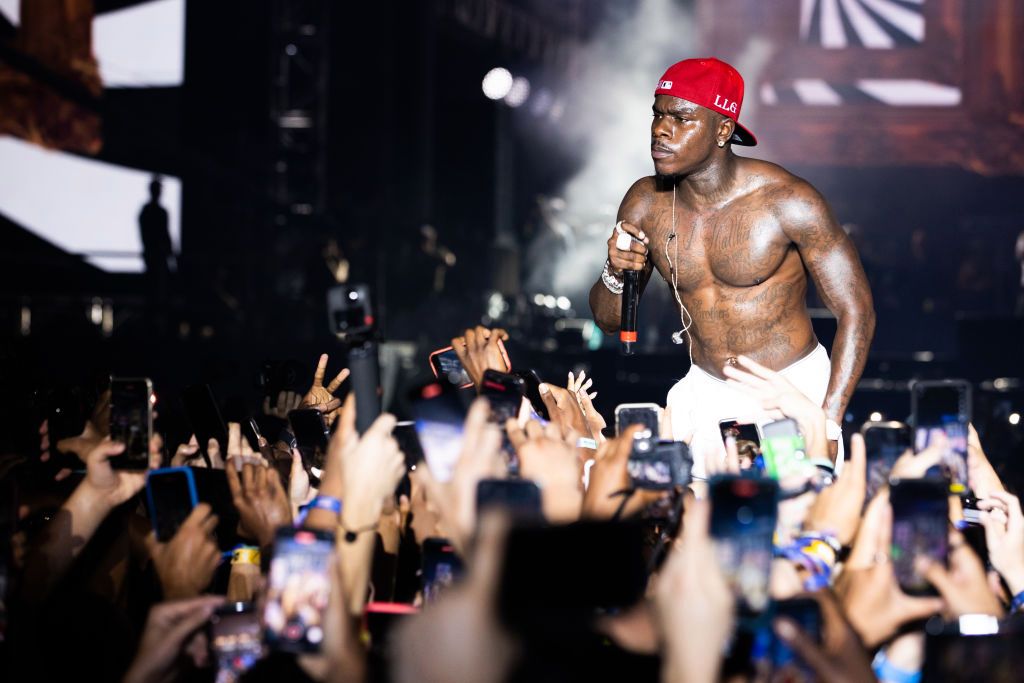Rapper DaBaby Gives Bare Minimum Apology For Homophobic Rant After Losing Da Big Bag
DaBaby performs onstage during Rolling Loud at Hard Rock Stadium on July 25 in Miami. | Source: Rich Fury / Getty
After being dropped from multiple events and widespread backlash, rapper DaBaby has for a second time said he’s sorry for a homophobic rant he recently made to fans live on stage. Some Twitter users were not moved and questioned the veracity of the apology.
DaBaby gave us DaBullshit with DaApology because he fumbled DaBag for embracing DaBigot and now he’s gonna act like he’s DaPressed. DaFuckOuttaHere. https://t.co/8RD6XBPAf8
— Andreas Hale (@AndreasHale) August 2, 2021
His statement failed to address multiple instances of doubling down on making homophobic statements, including a music video he made in which misinformed statements around HIV and AIDS were amplified. The Black AIDS Institute used the moment to expand the conversation around living with HIV and uplifting queer Black communities.
We heard #dababy comments. We’re using them as an opportunity to uplift our peoples and talk about #HIV. Because we will not be shamed. #StopHIVStigma pic.twitter.com/motm43btUe
— Black AIDS Institute (@blackaids) July 31, 2021
In a statement released Monday, the organization focused more on uplifting accurate information than DaBaby’s harmful comments.
“We recently witnessed inaccurate and hurtful comments directed towards our community,” said Black Aids Institute President and CEO Raniyah Copeland. “This incident and the public reaction prove there is much work to be done, and it must be done in the whole of Black communities.”
Copeland listed several things people absolutely needed to understand about HIV, noting Black queer communities are at risk for HIV. She also explained that risk for HIV has to do with an environment that allows inhumanity, misinformation, and hate to flourish.
She also lifted up the organization’s call for applications to the African American HIV University, along with other opportunities to learn more about the organization’s work. The Black AIDS Institute is the country’s only Black-led organization centered on the AIDS epidemic.
Applications are OPEN for our African American HIV University! For 20 years we’ve trained and elevated Black leaders to strengthen the HIV workforce. Apply by Aug. 15!
Science and Treatment College: https://t.co/SnBvXLnNe8
Community Mobilization College: https://t.co/1n0AEyayZp pic.twitter.com/o9N45GaZfb
— Black AIDS Institute (@blackaids) July 27, 2021
Preston Mitchum, director of advocacy and government affairs at the Trevor Project, responded to some who claim DaBaby was being targeted because he was Black and pointed to how the rapper’s comments actually hurt Black people.
Many of the most critical voices have been Black people. Writer Jamal Jordan, known by the internet moniker Lil Uzi Hurt, challenged the idea that DaBaby’s upbringing made him incapable of empathy and critical thinking.
So many defenses of DaBaby are like, “He grew up poor and black in the hood, how did you expect him to develop EMPATHY and CRITICAL THINKING SKILLS”
…y’all…
please stop…
— Lil Uzi Hurt (@lostblackboy) August 2, 2021
Also noticeably absent from Da Baby’s apologies are recognition of his disrespect of fellow rapper Megan Thee Stallion. During his Rolling Loud performance, DaBaby brought out Tory Lanez, the performer previously accused of shooting Megan Thee Stallion. He took the immediately after her performance.
Various Twitter users mentioned that Lanez served no purpose on stage except to be messy. He didn’t perform or do anything of note and possibly violated an active protective order. While the rapper says he did not see Megan, Lanez was arguably within 100 yards of her as she had just been on stage performing.
Bridget Todd, communications director for UltraViolet and host of the podcast, “There Are No Girls on the Internet,” asked if DaBaby’s public relations team was also going to draft an apology to Megan.
Will DaBaby’s PR team also be drafting an apology for him supporting a man who violently attacked a Black woman?
— Bridget Todd (@BridgetMarie) August 2, 2021
Erasure of the Black experience from the conversation around HIV and AIDS is not new. June marked the 40th anniversary of the first reported AIDS cases. As previously reported by NewsOne, early discussions of AIDS completely removed Black people from the conversation giving the perception it was simply a white gay man’s disease.
“Stigmatizing this health condition, which is no different from many other chronic diseases, holds people back from accessing life-saving HIV services,” Coleman continued. “It also deters the progress made toward uplifting the lives of people who are Black, LGBTQ, and/or living with HIV. All Black Lives Matter.”
SEE ALSO:
‘I’m Still Here’: 40 Years Since The First Reported Case Of AIDS, The Fight Continues
[ione_media_gallery id=”4171589″ overlay=”true”]

